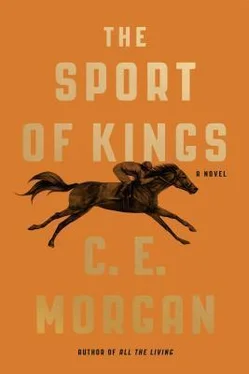Scipio turns his head from words so distasteful to him. He whispers only, “Pray this river to carry us across.” He knows it will — look how low and still it is, waters pulsing easily with the river’s own calm, even breath. He can already feel his ball-and-chain spirit becoming no heavier than a feather. The patrollers are just a fading nightmare of childhood, the speculators too, the great house, and his life there, even the death of his dear mother. And see there, in place of that old dream, how near stands the opposite shore, night eliding distance, so a man can reach out strong swimmer’s arms and almost touch it.
He’s been wasting time gawking; he hunts hurriedly around the shadowy shoreline for driftwood and finds, instead, the moldering remains of what might have been a rowboat’s stern — he guesses from the angle of the sawn edge of the wood in his hand. Very little of it remains.
“Now swim with this in the crotch a your arm,” he says, and wedges it awkwardly into Abby’s damp armpit. Then he unties his tattered, sand-caked brogans and leaves them on the shore; he does not want to wear the shoes of slavery on the other side.
He grasps up Abby’s hand, says nothing more, and guides her stealthily from boulder to boulder, both of them slunk down low, though she can barely bend with her protruding belly. She grunts audibly as she walks.
The Ohio River is icy cold and in a moment it swallows them whole. Only their heads show and he thinks, Carry us, carry us, carry us, carry us, and then the rocky bed swoops away from under their feet, the hungry current carrying them as they plow through its eddies, both of them good, strong swimmers, though Abby slower because of her bulk. Scipio, slightly ahead, fastens his eyes on the black tree line on the far side, the river itself hastening him there, the current sweeping him closer to Ohio, closer to the dream, closer to Bucktown and a church of brethren who will help him, closer, closer now, ever closer. They cross the midway point of the river, the only sound their own labored breathing.
“Oh,” Abby says once, somewhere behind him.
“Hush,” he whispers back, plowing on with wide, chopping strokes.
“Oh,” she moans, and then her voice is full of water. There is a brief thrashing sound, another gasp, and she slips below. She doesn’t cry out again, but her hands crash once more on the surface like the sound of two oars smacking, and Scipio tears his eyes from his salvation and ceases his powerful swimming to look back, only to find the white ructure she’s made on the surface of the water. He drifts for a moment in pure panic, unsure what to do, pulled powerfully between two worlds. Then with an involuntary cry, he swims back to her. Once again Abby finds the surface, and he sees for one moment her panicked eyes in the faint light of the moon, and he will never forget the sight of her desperation. Then she slips below. She fights against the swamping weight of the water, thrashing violently, striving for its glistening black surface, but her body clamps in on itself as if the child were struggling mightily within her. Her legs draw up suddenly in a wrenching spasm, and her arms whip wildly about and spin for purchase until she finds Scipio’s leg, which she grips with all the life force bestowed upon her by right of her own birth. Without warning, she yanks him beneath the surface, and with blind horror, Scipio kicks downward. Quick as lightning, guided only by instinct, his foot finds her belly. Her hands release, and like a stone, Abby drops away.
Now Scipio fights for the shore as if the devil himself were after him. He’s weeping in horror and drinking the river as he goes, sick with panic and making no effort at all to conceal his passage but only trying to escape death, which would drag him with its iron shackles down to the bottom of the river. He crashes desperately through the sucking current until he finally feels the stony riverbed beneath his bare feet and lurches out, stumbling like a drunk among the rocks and fallen branches. On the bank, he looks like a madman, his hair matted and soaked with the spit of the river, his jaw loose, his eyes horribly wide. He touches his face with a shaking hand as if startled to discover that he is alive, but God, she is dead and he has killed her! He whips around once in disbelief to face the water. How he has longed for this moment since he was a child and now … The river is speaking to him, its words a curse. He stumbles back, away from the sound. Ten steps and the words are a mere prattle. Ten more and the prattle is a whisper. Ten more and the whisper is just a river flowing silent and black, no more dangerous than fiction, no more true than myth. Trembling, he whips around toward the thousand firelight twinklings of Cincinnati a mere mile to the west. His broad, white-latticed back is a curtain drawn on the crude festival of the South. But oh, reader, now Scipio has found something worse than slavery, and will live fifteen more years trying to forget it. There are tales that are remembered and tales that are forgotten, but all tales are born to be told. They demand it; the dead become tales in order to live. Their eternal life is in your mouth.
What god requires a sacrifice of every man, woman, and child three times a day?
— YORUBA RIDDLE
Breathe.
Her graying hair was wrapped in a messy bun, her coffee was black and hot, her gear bag packed with syringes, tail bandages, Therapogen, and thermometers as always, but the truth? Lou didn’t want to go. And it wasn’t just because leaving her husband’s side at four in the morning was akin to leaving the warmth and safety of the womb. She couldn’t shake the dream she’d woken from with a start: the numinous horse, off-white as a shell’s nacre, the way it opened its sickeningly lopsided mouth and emitted a hellish sound like the shriek of an old steamboat calliope, that failed music designed to replace church bells in Cincinnati. And then to be woken by the girl’s voice — the Forge daughter, now the farm manager for her father, his right hand. Flat, affectless voice, cold like a stone you couldn’t warm even if you tossed it in a fire. She’d called to say Seconds Flat had been streaming milk down her legs for two days and was agitated now, though she’d shaped up nicely over the last week. The girl — no, the woman, she was probably twenty-five — was smart and not prone to drama; if a 4:00 a.m. phone call was necessary, then Lou was needed directly.
Be in your center. As she drove, Lou welcomed the dark morning into her lungs and thanked the world for this offing day with the old meditative habits: witness, gratitude, devotion, coffee. But deep down, she knew she was just dragging her heart along like an old can on a string. There was a dread in her belly, and her body never lied, just as an animal’s body never lied. It had nothing to do with a difficult parturition, which could leave everyone exhausted and heartbroken if an animal was lost, and everything to do with where she was going. As her husband — a man who’d lost his filter many years ago — liked to say: Those Forges are motherfucking nuts.
Breathe.
She switched on her brights outside of Paris, casting the rural world into cameratic relief. The old fenced oaks made strange figural silhouettes, a stray horse caught her headlights with globular luminescent eyes, the colorless January frost gleamed — and she breathed in the peace, this dark reservoir of quiet free to those who worked third shift and poor souls like her, who worked any and all shifts every day. But her peace was brief; she was slowing down along Forge Run Creek and the turnoff. She used to come here as a shy teenager with her father, the famously irascible and opinionated Doc Jenkins. Back then, everyone had called her Lulu or Baby Lou. When she’d announced at the age of fifteen that she intended to become a vet, her father was at first dismissive, then disbelieving, then truly angry. “Women don’t have what it takes to be veterinarians!” he’d yelled, and then listed her faults — too sensitive, too quick to tears — none of which she could deny and none of which deterred her. He’d forgotten that she was also stubborn, practical, and taught by five older brothers to move directly into a headwind. When her emaciated little mother, worn half to death by rearing six children and smoking two packs of Burleys a day, had pulled her aside and in her exhausted way said, “Do whatever you want to do, Louisa, but don’t tell your father I said so,” they were kind but wasted words. Lou’s mind was already made up.
Читать дальше
Конец ознакомительного отрывка
Купить книгу












